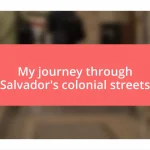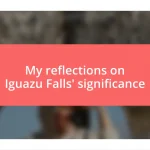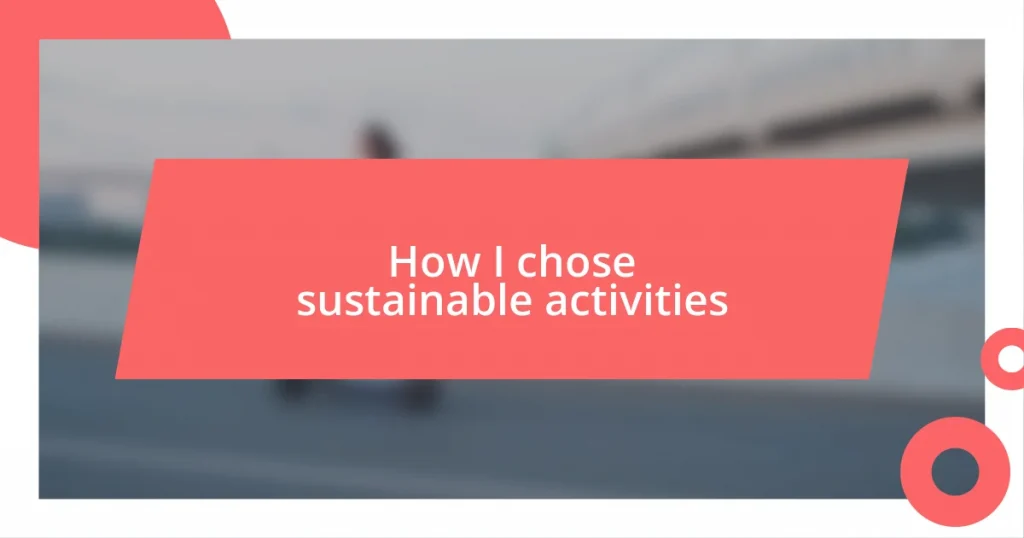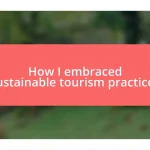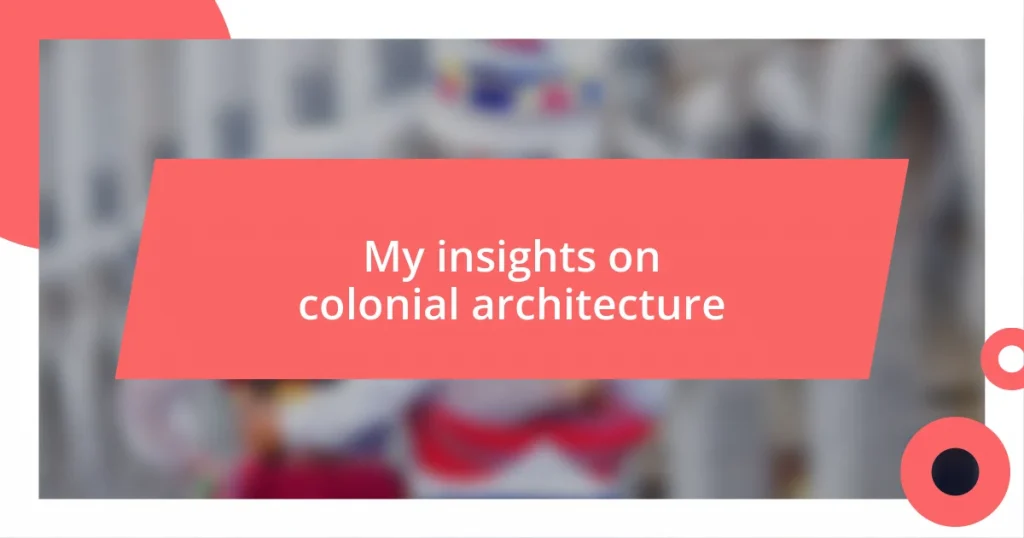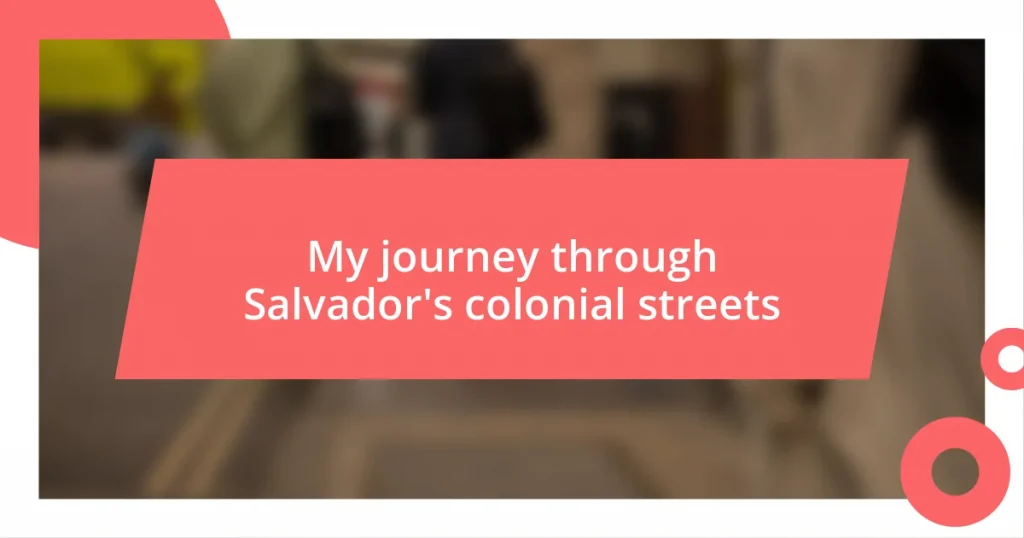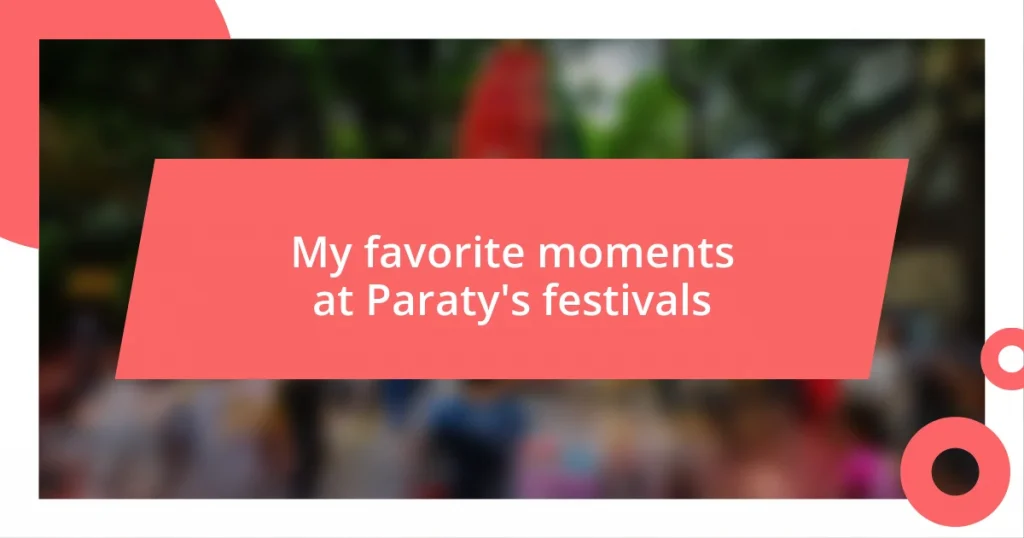Key takeaways:
- Emphasized the importance of reducing consumption and understanding the interconnectedness of actions, like composting, which positively affects local ecosystems.
- Identified personal values and priorities guided sustainable choices, leading to community engagement and participation in meaningful activities.
- Shared experiences inspired others to join sustainability efforts, highlighting the ripple effect of individual actions on broader community engagement.
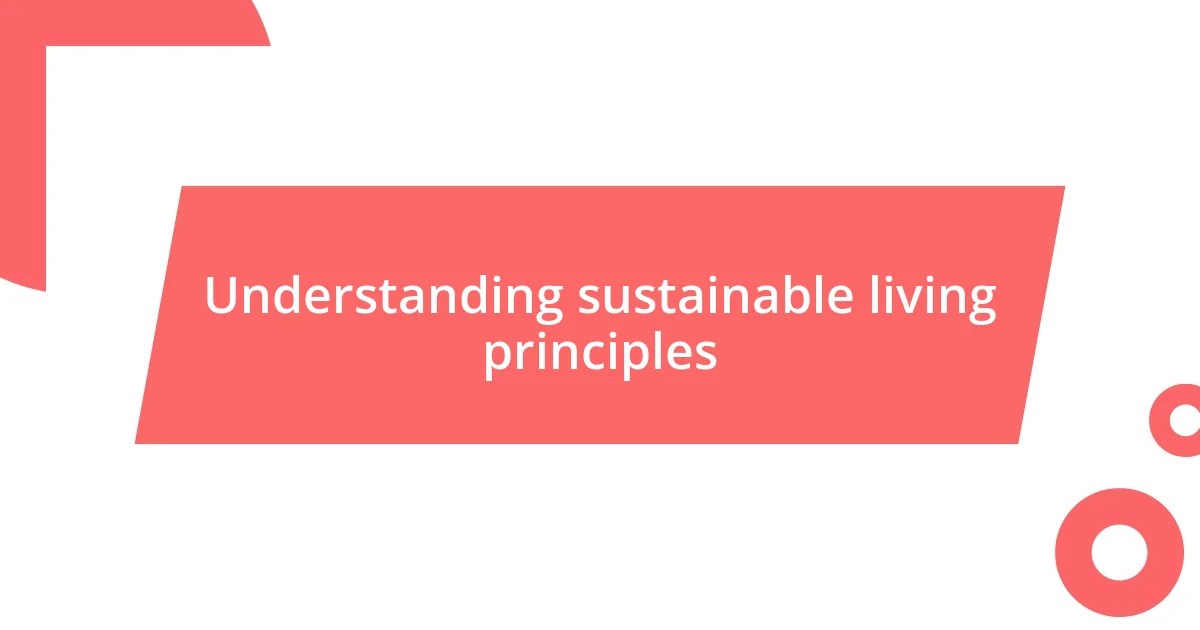
Understanding sustainable living principles
Sustainable living principles are grounded in making choices that minimize harm to the planet while enhancing the quality of life for all its inhabitants. When I first learned about these principles, I wondered, what does it truly mean to live sustainably? This question led me on a journey, transforming my daily habits and interactions with my environment.
One core principle is the idea of reducing consumption. I remember a time when I mindlessly bought whatever I wanted without considering the broader impact. Now, I always think twice before purchasing. Is this item essential? Can it be reused or repurposed? This mindset shift has not only brought me joy in decluttering but has also made me more conscious of what I bring into my life.
Another key aspect is understanding the interconnectedness of systems. Embracing sustainable living taught me that every action has a ripple effect. For instance, when I started composting, I realized how reducing food waste positively impacts local ecosystems. It’s incredible how small changes in our routines can lead to healthier communities and a more vibrant planet. Have you ever considered how your choices contribute to the bigger picture?
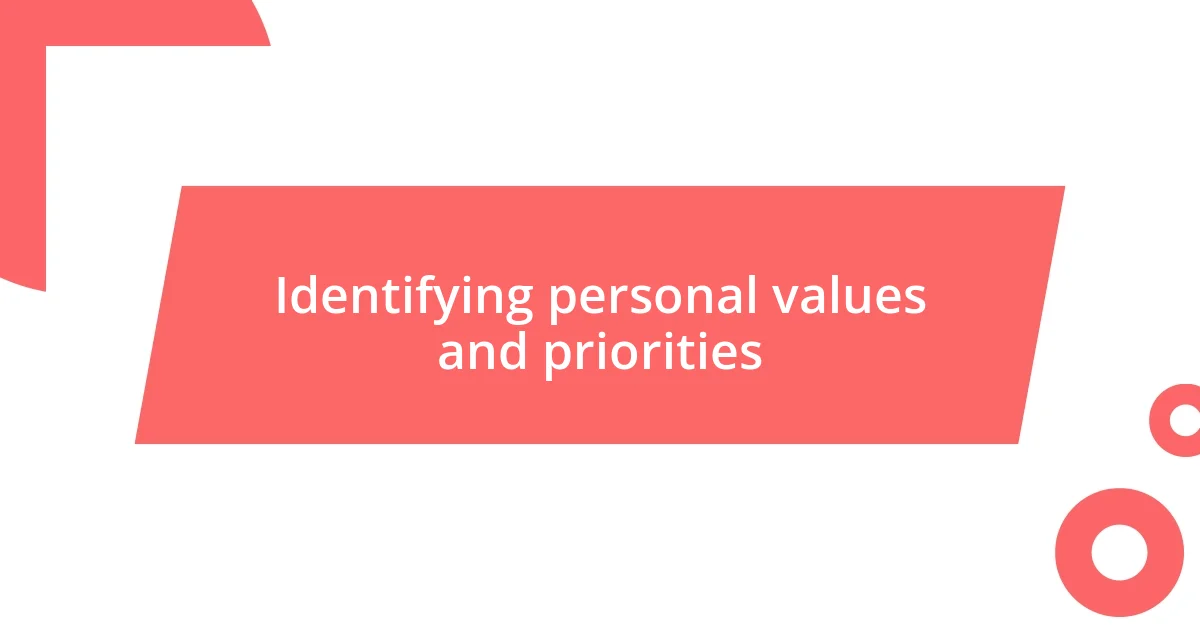
Identifying personal values and priorities
Identifying personal values and priorities is a crucial step in my sustainable journey. I found that reflecting on what truly matters to me guided my choices. For example, I used to prioritize convenience above all else, but now I value sustainability and community engagement more. This shift in priorities transformed how I interact with products and services around me.
Here are some questions that helped me clarify my values:
- What do I care about most—environmental issues, community welfare, or personal health?
- Which activities bring me joy and align with my values?
- How do my daily habits reflect the changes I want to see in the world?
This introspection encouraged me to participate in local clean-up events, realizing that my commitment to sustainability extends beyond my consumption choices. It’s fulfilling to see how aligning my actions with my values can create a sense of purpose and connection.
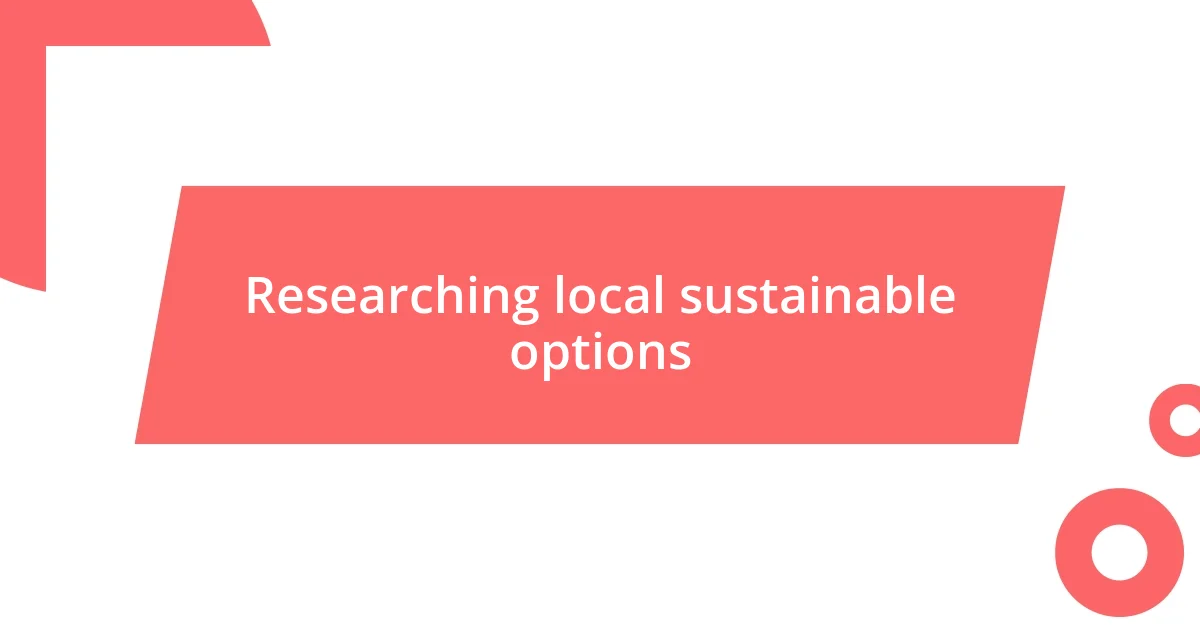
Researching local sustainable options
When I embarked on my quest to find local sustainable options, I quickly realized that research was key. Walking through my community, I started to notice local farmers’ markets and eco-friendly shops I hadn’t paid attention to before. I remember being pleasantly surprised by how many resources were actually available to me. Attending local sustainability fairs revealed artisans who were committed to using recycled materials, and learning about their stories made a lasting impact on my purchasing choices. Have you ever felt that delightful moment of discovery? It’s something I cherish.
Not only did I seek out local businesses, but I also engaged with online communities focused on sustainability. Websites, social media groups, and forums became a treasure trove of information. I vividly recall when I found a local eco-group that organized workshops on upcycling. That experience opened my eyes to a new world of creativity. While chatting with fellow attendees, I began to understand their motivations and dreams for a greener future. This exchange of ideas ignited my passion and inspired me to take action right in my neighborhood.
As I continued researching, I created a comparison chart to help clarify my options. I wanted to evaluate each sustainable activity based on several criteria. This was really informative and helped solidify my choices about where to invest my time and energy.
| Activity | Impact |
|---|---|
| Local Farmers’ Market | Supports local economy, reduces carbon footprint |
| Community Clean-up Day | Enhances local environment and fosters community engagement |
| Upcycling Workshops | Encourages creativity while reducing waste |
| Eco-Friendly Shops | Promotes sustainable products and fair trade practices |
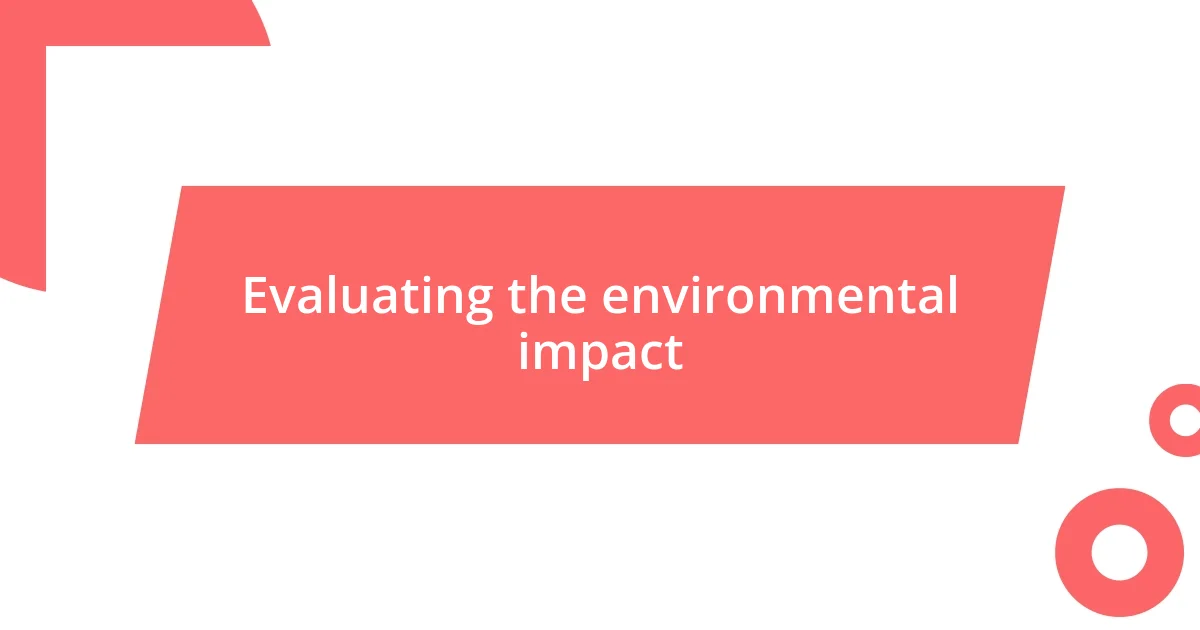
Evaluating the environmental impact
Evaluating the environmental impact of my choices became an eye-opening experience. When I started assessing activities, I realized that each decision had a ripple effect—not just on the environment but also on my community. I found myself asking questions like, “What will this product’s lifecycle look like? How long will it last, and what will happen to it once I’m done?” These inquiries made me more conscious of both immediate and long-term consequences.
One particular moment stood out to me during a community workshop focused on environmental impact assessments. As I listened to a speaker discuss the carbon footprint of single-use plastics, I felt a wave of guilt wash over me. I had been guilty of buying convenience over sustainability. But it was enlightening—each statistic hit home, pushing me to shift my perspective completely. It felt empowering to know that my choices weren’t just individual; they were part of a collective movement toward better practices.
I find it fascinating how merely evaluating my activities often leads me to unexpected insights. For instance, after examining the impact of my grocery shopping habits, I opted for a subscription to a local organic farm. This simple change didn’t just reduce my carbon footprint; it allowed me to build relationships with local growers, thus creating a deeper connection to my food and its origins. Have you experienced that moment when an action truly resonates with your values? For me, that realization was the game-changer.
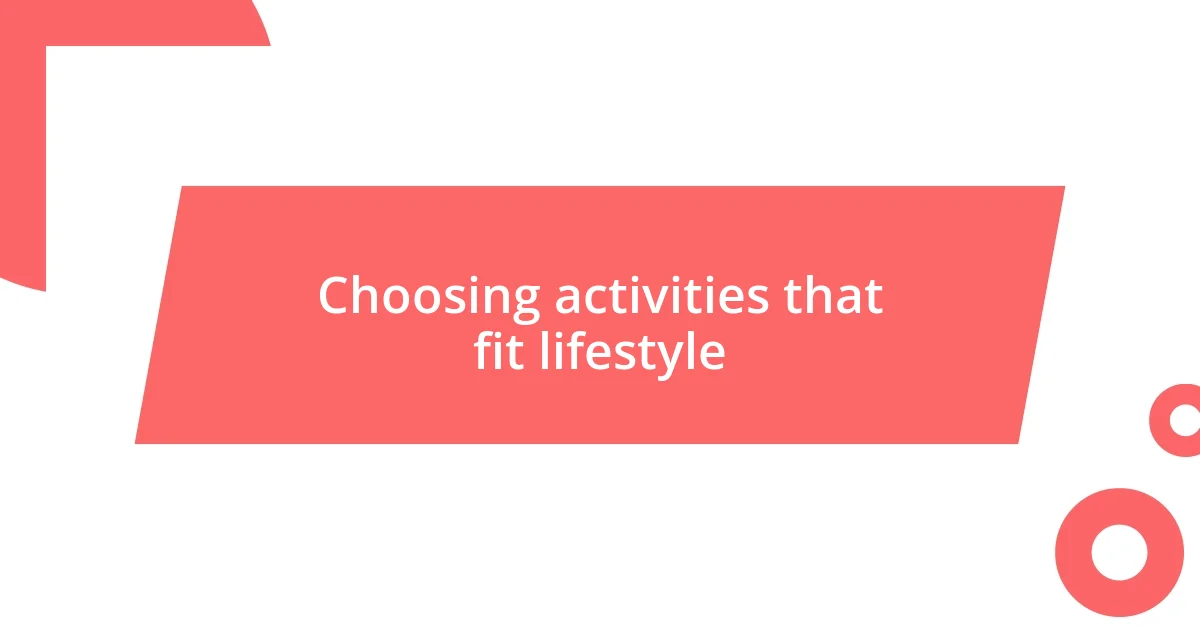
Choosing activities that fit lifestyle
Choosing activities that resonate with my lifestyle has been an enlightening journey. I realized that aligning these activities with my core values made them more enjoyable and sustainable. For example, rather than signing up for a traditional gym, I sought out outdoor yoga classes in local parks. Not only did it fit my love for nature, but it also opened doors to friendships with like-minded people who share my passion for the environment.
I remember a specific weekend where I joined a community gardening group. As I dug my hands into the soil, I felt an undeniable connection to the earth and its offerings. It wasn’t just about growing food; it was about nurturing relationships and fostering a sense of belonging. That experience prompted me to reflect: how many of my activities contribute not only to my well-being but also to a supportive community? This question has guided my choices ever since.
Incorporating sustainable activities into my lifestyle has transformed how I engage with my surroundings. I often prioritize experiences that allow me to reduce my carbon footprint while connecting with others. For instance, I’ve embraced cycling instead of driving for short trips, and the rush of the wind against my face is exhilarating. Have you ever made a change that felt so right that it invigorated your spirit? For me, these choices breathe fresh air into my life, making sustainability not just a practice, but a fulfilling way of living.
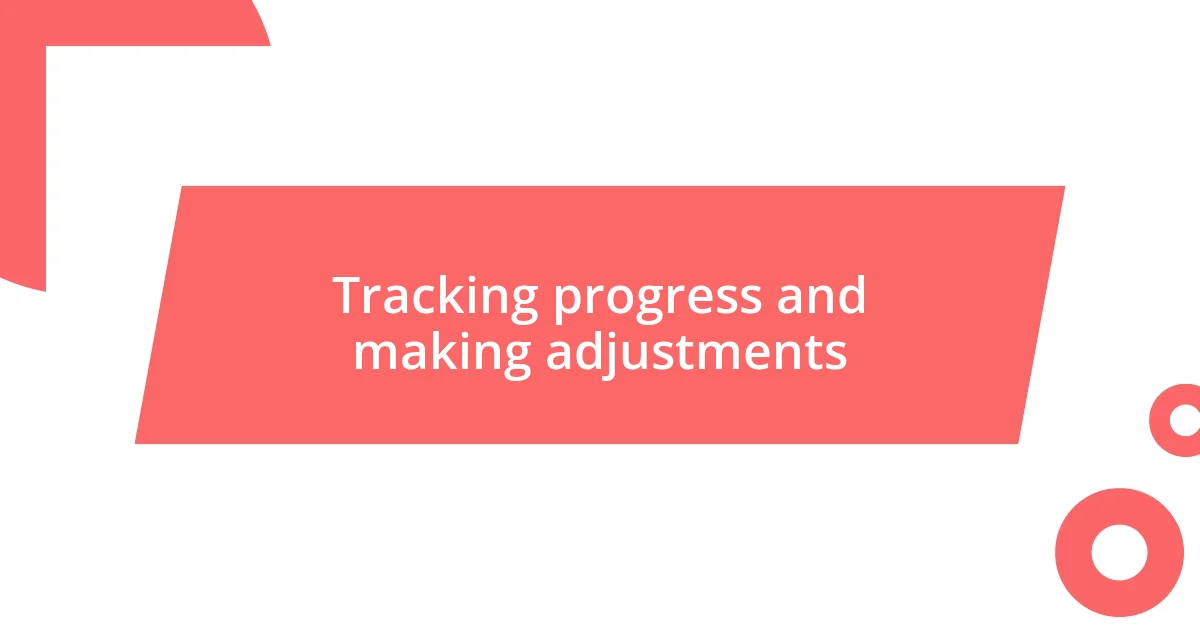
Tracking progress and making adjustments
Tracking my progress toward sustainable activities has been a dynamic, ongoing journey. I keep a journal where I jot down insights and feelings after each experience. Recently, after switching to a zero-waste lifestyle, I noticed I was simply accumulating too much information without reflection. This prompted me to create a monthly check-in where I evaluate what’s working and where I might need to pivot. Have you ever felt overwhelmed by too many changes at once? I certainly did, and it helped to take a step back and breathe.
One particular moment that stands out to me was when I reflected on my water usage. I measured how much I was consuming daily and found that even small changes—like switching to a low-flow showerhead—reduced my usage significantly. It was gratifying to see tangible results from my efforts! Tracking these changes not only held me accountable but also inspired me to keep pushing for more. When was the last time you celebrated a small victory? I’ve learned that each win, no matter how minor, keeps me motivated on this path.
I also discovered that adjusting my approach was crucial for sustained success. When I noticed that composting was becoming a chore, I revisited the process, trying various methods to find the one that resonated with me. This exploration led to a delightful moment when I realized that vermicomposting—using worms—simplified my waste management. That little change rejuvenated my commitment to sustainability. Have you found a method that clicked for you? I believe that being flexible and open to change is key to truly embracing a sustainable lifestyle.
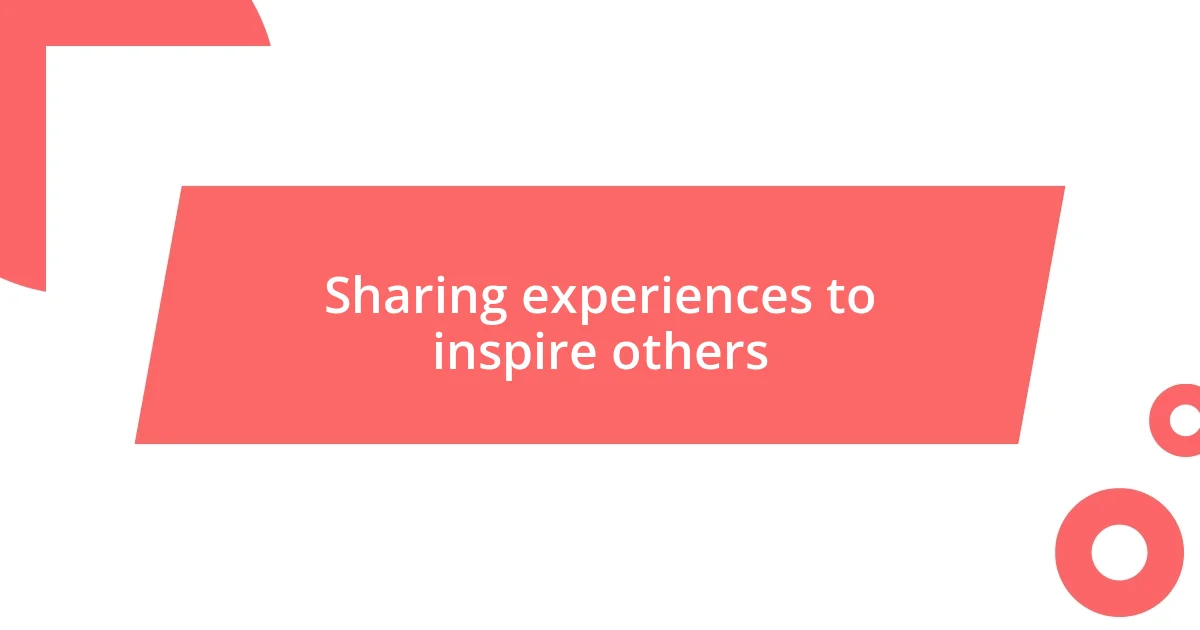
Sharing experiences to inspire others
Sharing my experiences with sustainable activities has often sparked conversations with others, inspiring them to join the journey. For example, after I posted a recent hiking trip that focused on picking up litter along the trail, I received messages from friends expressing their newfound interest in hiking for a cause. It’s incredible how one experience can resonate and motivate others to take action. Have you ever shared a moment that unexpectedly ignited someone else’s passion?
Reflecting on my participation in a beach clean-up last summer, I felt a deep sense of purpose as I collected plastic waste. I didn’t just clean the beach; I shared the stories of marine life impacted by pollution with fellow volunteers. This led to a powerful discussion about responsible consumption and environmental responsibility. How many times have conversations sparked ideas and initiatives in your life? It’s moments like these that illustrate the ripple effect of sharing, transforming personal experiences into a collective movement.
The simple act of sharing my sustainable choices on social media has yielded surprising connections. I’ve had strangers reach out to discuss zero-waste tips or local sustainability events they’ve started as a result. It’s a beautiful reminder that our stories hold power; they can encourage others to reflect and act. Have you considered how sharing your journey can uplift and inspire your community? Through these interactions, I’ve realized that our collective experiences can help ignite change in ways we may never fully see.

